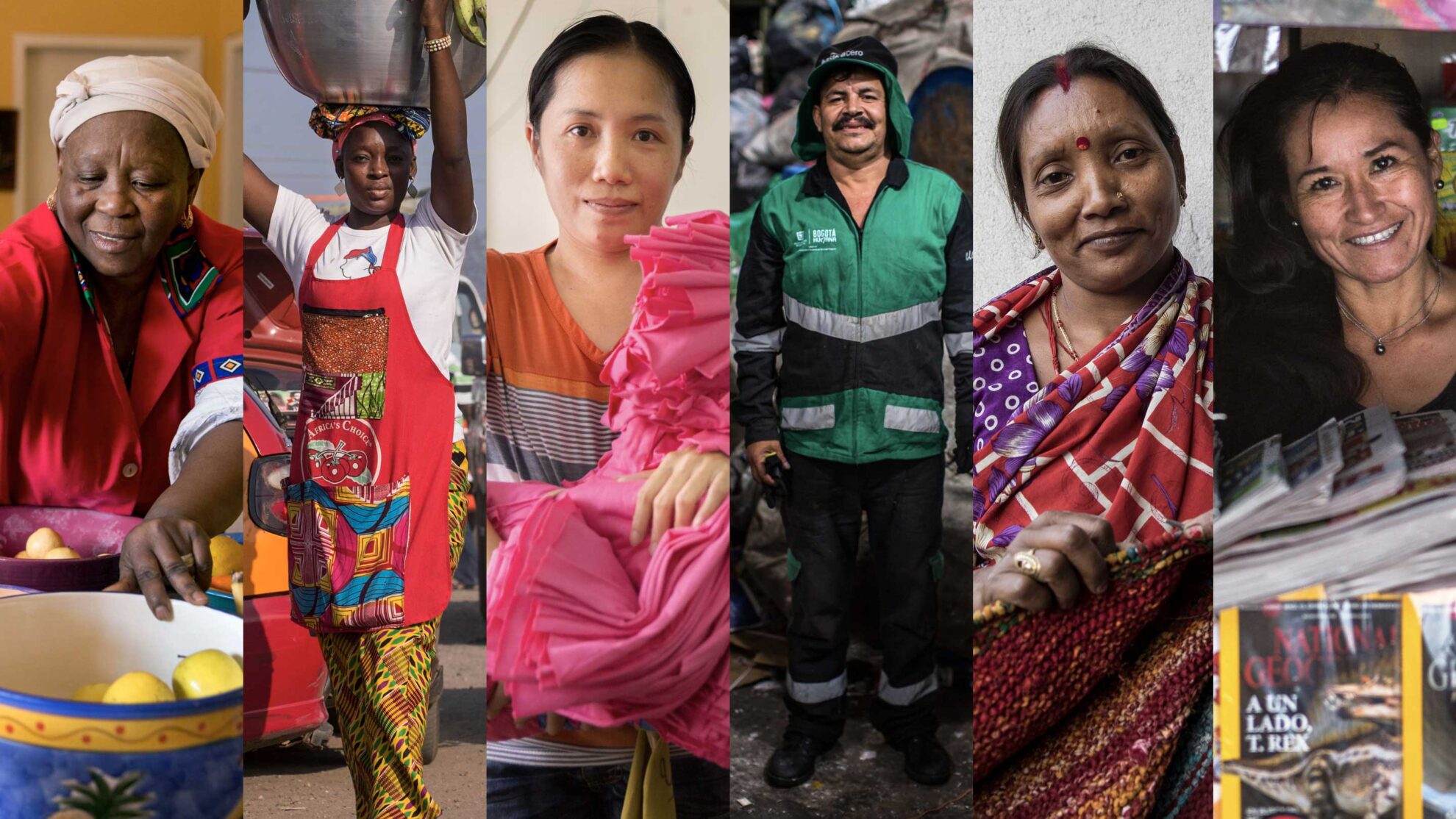A global, multi-city study by WIEGO (Women in Informal Employment: Globalizing and Organizing) has found that informal workers in Accra are in crisis, earning far less in 2021 than they did before the COVID-19 pandemic. The Accra Metropolitan Assembly (AMA) has responded to this crisis with repression rather than relief: the widespread evictions of workers as part of the 2022 “Clean Your Frontage” campaign threaten to further destabilize informal workers’ livelihoods, and push workers deeper into poverty and hunger.
The WIEGO-led COVID-19 and the Informal Economy study tracked the impact of the COVID-19 crisis on informal workers in 11 cities over two years. In Accra, the research covered four sectors of informal workers: street vendors, waste pickers, market traders, and kayayei. The latest round of WIEGO’s research in Accra shows:
- No recovery: Informal workers in Accra have not recovered pre-pandemic earnings. After median monthly earnings for all sectors dropped to zero during the period of strictest restrictions in April 2020, they recovered to a limited degree in mid-2020. However, in a sign of deepening economic hardship for informal workers, between mid-2020 and mid-2021, earnings declined further. By mid-2021, the median monthly earnings of respondents in all sectors were only one-third of their pre-COVID earnings.
- No relief: Out of 11 cities in the WIEGO study, workers in nine cities received some form of cash-grant relief to help them cope with the crisis. Accra was one of only two cities where no cash grant program was made available to informal workers during the two years of the crisis.
- Rising hunger: Rather than improving, food insecurity has increased since mid-2020. Forty-four percent of workers reported household adult hunger and over half reported skipping a meal or eating a smaller variety of foods. Food insecurity levels are most severe for the kayayei –100% of kayayei reported incidents of adult hunger. Despite high levels of food insecurity, only 5% of workers received food relief from the government.
New barriers, including government repression: Informal workers are facing new obstacles to working and earning, including lack of customers, rising prices, and increased competition. Evictions around market areas and policies that have increased taxation of informal workers have made a difficult situation worse.
According to the Informal Hawkers and Vendors’ Association of Ghana (IHVAG), Greater Accra Markets Association (GAMA), Kayayei Youth Association, and Kpone Landfill Waste Pickers Association, the government should take the following actions to support informal workers in economic recovery:
- Recognize and protect informal workers’ right to work
- Improve the safety and security of informal workers’ places of work
- Provide immediate economic support in the form of cash grants and soft loans
- Treat informal workers as stakeholders and partners in building a just recovery for all
For interviews or further information please contact:
- For local (Accra and Ghana inquiries) Dorcas Ansah (dorcas.ansah@wiego.org) +233 26 301 0959
- For global inquiries Mike Rogan (mike.rogan@wiego.org)
EDITOR’S NOTES
Women in Informal Employment: Globalizing and Organizing (WIEGO) is a global network focused on empowering the working poor, especially women, in the informal economy to secure their livelihoods. We believe all workers should have equal economic opportunities, rights, protection and voice. WIEGO promotes change by improving statistics and expanding knowledge on the informal economy, building networks and capacity among informal worker organizations and, jointly with the networks and organizations, influencing local, national, and international policies.
The COVID-19 Crisis and the Informal Economy study is a collaboration between Women in Informal Employment: Globalizing and Organizing (WIEGO) and partner organizations representing informal workers in 12 cities: Accra, Ghana; Ahmedabad, India; Bangkok, Thailand; Dakar, Senegal; Dar es Salaam, Tanzania; Delhi, India; Durban, South Africa; Lima, Peru; Mexico City, Mexico; Pleven, Bulgaria; New York City, USA; and Tiruppur, India; with support from the International Development Research Centre, Canada. The mixed-methods longitudinal study includes survey questionnaires of informal workers and semi-structured interviews with informal worker leaders and other key informants, all conducted by phone. Please note: The study data from Dar es Salaam, Tanzania, with domestic workers is not included in the global results because of the relatively larger sample from one sector, which would have skewed the global results. All global tabulations and comparisons, therefore, refer to 11 cities.
